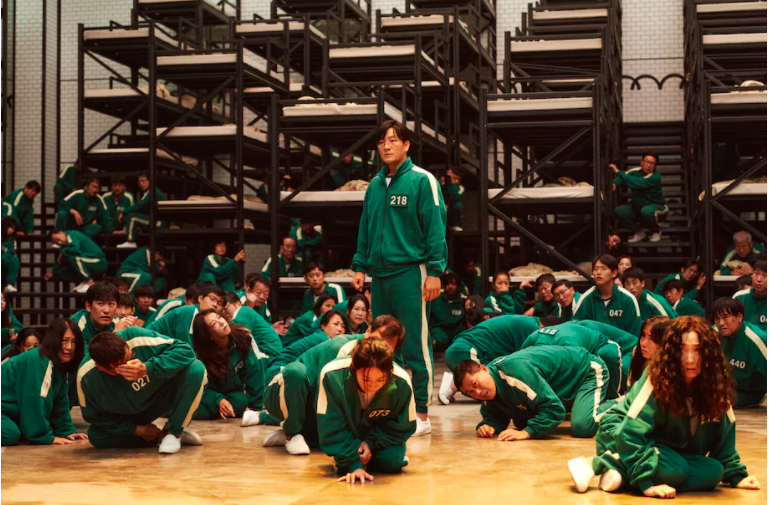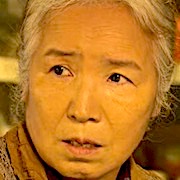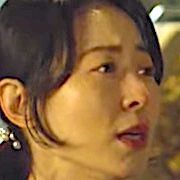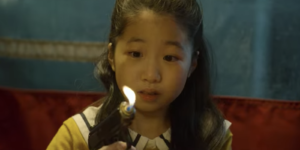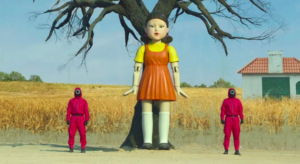I finished Squid Game before bed yesterday and ended up tossing and turning all night trying to make sense of it. It was a crazy, anxiety-inducing ride, and though I had fun watching it, the women characters are abysmal.
***Spoiler Alert***
I really enjoyed Squid Game, though I had to follow it up with old comedy re-runs before bed to stave off dystopian classist capitalist nightmares. If you haven’t seen it, I suggest you read no farther. Spoilers of the highest level follow.
Back to my point: despite the surface appearance of some strong women characters, upon examination they all fail to hold up. Let me show you. It won’t take long. There aren’t many.
First, the players: There are three female main players in the games. The rest are just part of the crowd.
To start off, there’s the scrappy, foul-mouthed Han Mi-Nyeo who has a strong presence and a lot of street smarts. Bullied for being a woman, she uses sex to try and form an alliance with another gangster, which, surprise, doesn’t work. She’s so angry about it, she kills herself along with him to get her revenge. Though we do get some of her backstory, including that she claims to be a single, uneducated mother, her character isn’t filled out enough to get any screen time outside of the games. It’s pretty disappointing that her actions are completely based on a male character. Maybe this was intentional to show the lack of control she had over her own life. Maybe not. So Woman #1: a semi-complex female character whose only tool is sex and who then reacts to being scorned by sacrificing her own life demonstrating that only men determine her fate.
Then there’s Ji-yeong, who is more a secondary character and whose only purpose is to draw out the story of Kang Sae-byeok’s harrowing journey out of North Korea. It’s implied that Ji-yeong, who isn’t given a last name, was sexually abused, another trope plot device for a female character, which turned her into a murderer. So Woman #2: a shallow female character who only exists as a plot device to extract another character’s backstory and whose sexually abusive background gives her a good reason to kill herself.
And finally, Sae-byeok, the only female character we’re allowed to see in the real world outside of the games. She is pretty, tough, cool, somewhat kind and not given any kind of sexual backstory. Yay for that. Also, in real life she is a model, of course. But then she’s killed off solely to set up the final mano a mano battle between the two real main characters. We all knew she was never going to be the winner, though she should have been. Ta-da, Woman #3: a bad-ass, gorgeous young female character who is killed off to further the more important male characters’ stories. Who saw that coming.
That’s it for main characters. Moving on to the lesser roles.
Minor characters: The two moms, the ex-wife and a daughter.
For our Woman #4 there’s Cho Sang-Woo’s mom, Park Hye-jin, the smiling, kindly old woman who runs a fish shop in an outdoor market and thinks her son is off in the US buying her presents. She is naïve, hardworking and sweet, the perfect model of a nurturing, sexless Korean mother. In the end, our hero, Seong Gi-hun, just gives her Sae-byeok’s 11-year-old brother who he found in an orphanage (who actually looks about 7, definitely not 11. And how is anyone legally allowed to just give away a child to someone anyway?), whom she happily accepts as a replacement-son to raise, which based on the age they have made her look, can’t be for too much longer.
Then there’s Woman #5: Gi-hun’s mom, Oh Mal-Soon, also a grey-haired, sexless old woman with a stooped back from a lifetime of hardwork who tries to be Gi-hun’s moral compass by telling him to be a better father. He just steals her debit card. At the end, she dies of diabetes because she was too poor to pay for an operation after Gi-Hun stole her insurance money. She exists to characterize Gi-hun as the mess that he is.
6) Woman #6, Gi-hun’s ex-wife, doesn’t get a character name and makes it on screen for all of about two minutes only to show that she has a better husband now to take care of her and whom she is worried will be upset if he discovers Gi-hun in the house. She also tells Gi-hun about their plan to take their daughter, without his permission, to the United States. She exists simply to show another of Gi-Hun’s life failures
7) And finally Girl #7: Ga-yeong, Gi-hun’s 10-year-old daughter, gets a couple of scenes in which she seems pretty disapproving of her dad’s behavior, yet another female moral compass in his life who also seems to love him. In the end, he’s about to get on a plane to go visit her in the US, but abandons the trip to turn around and go find out who is behind the games (which he already knows: the tricky Oh Il-nam, Gi-hun’s gganbu, maybe even his father. So not sure what else he is going to go find out here. I guess Season 2?) She exists to give him a reason to be better.
That’s it.
Here are a few other points:
The guards: No women here. They clearly aren’t strong enough to hold guns and shoot people.
The power structure behind the games: No women here either, a lot like Korea itself.
The VIPs: Also, no women. Because only men take part in ruthless, dehumanizing capitalistic death games? Right. Maybe when the casting agents rounded up all the white guys from the pub over in Daejeon to badly read the scripts for the parts of the slimy yet oddly boring VIPs, there weren’t any women swilling pints at the bar that day. We do see a few naked women painted up like leopards though. (Update: I read this illunimating article from the Guardian about why the VIP scenes are so stitled, including poorly translated scripts given out of context, deliberate overacting and non-native editors choosing the takes. I take it back. They didn’t come straight from a Daejon pub.)
Some other moments with women: Remember when the guard was sure that the dead body wasn’t the infiltrator cop’s older brother? That’s because they gang raped the corpse. Had to be a woman. No one would gang rape a man. Or remember in episode two when the players beg to be allowed to leave and first, all the women fall to their knees crying while the men stoically stand? A few men, definitely not the manly Sang-woo, eventually kneel too (see photo at top). Or when all the men are competing at marbles to see who will live and who will die, the two women just talk? Or when they have to form teams for the third game and no one wants the women, despite the first two games having nothing to do with strength? In fairness, this feels deliberate and a good critique of Korea’s established gender discrimination. Probably the best female representation is the giant robot doll in the first game that uses her motion sensor eyes to kill anyone who moves.
Overall, despite there being a lot of screen time and good acting from the two main female players who add a lot of humanity and interest to the show, the women characters in Squid Game end up cliches whose existence only furthers the mens’ storylines, and the complete omission of them from the power structure of the games is both delusional and insulting.
Then again, Korea is pretty well known for its gender inequality. It has a long history of discrimination and sexism, misogyny really, and recent statistics show huge gender gaps in wages as well seats in the national legislature and in executive positions. If this is beginning of a new global era for Korean TV, let’s hope it gets women a little better on the next try, even when it comes to secret mass killings of people in track suits. For now, all we can do it cringe. And binge anyway.

